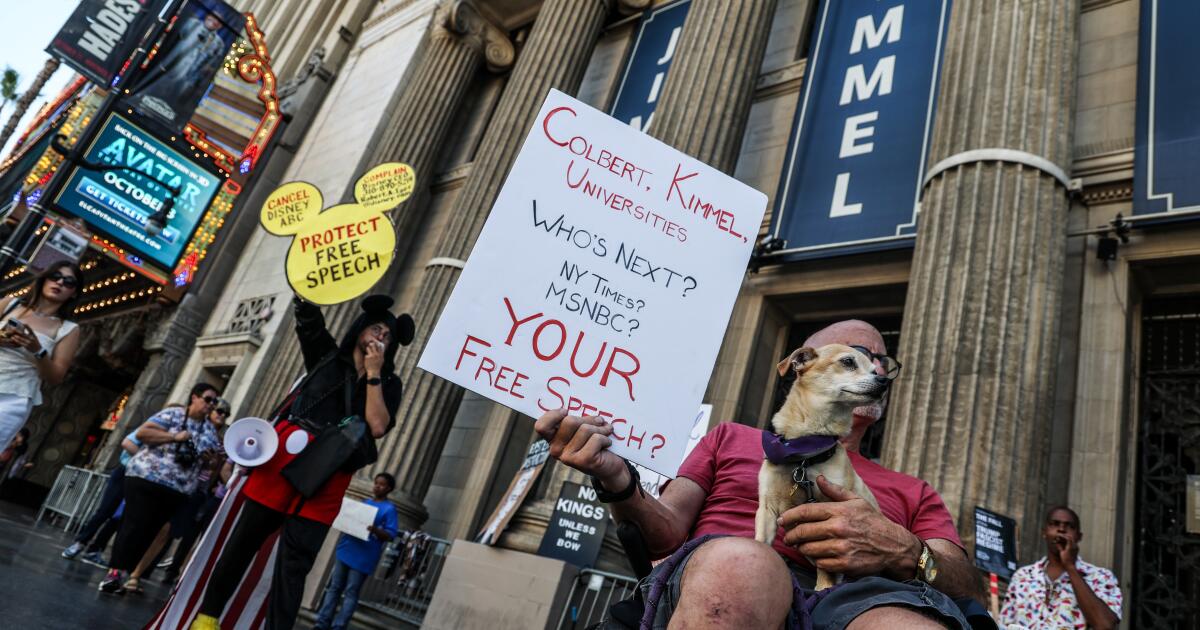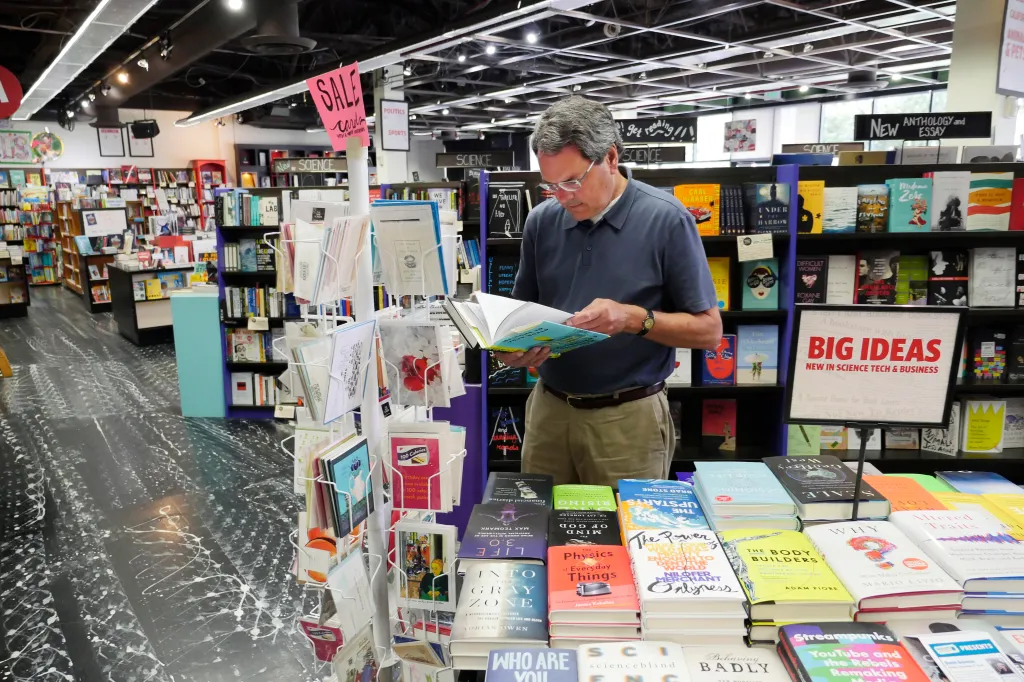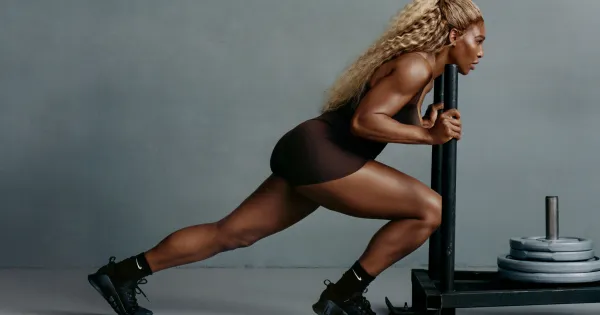
In Hollywood, something shifted in the six days between the time that Walt Disney Co. dropped “Jimmy Kimmel Live!” “indefinitely,” following Kimmel’s comments about the suspect in the shooting death of conservative activist Charlie Kirk, and the late-night comedian’s return.
For many, Kimmel’s rebound appears to be a win for free speech and a testament to the power of boycotts against powerful corporate interests. However, for other writers, particularly comedy scribes, who view the events that transpired in the darkest, most McCarthy-esque terms, the fight over comedy may have just begun.
“There’s fear and outrage at the same time,” said Emmy-winning comedy writer Bruce Vilanch, who for years was the head writer for the Oscars and “Hollywood Squares” and has written jokes for comics including Billy Crystal and Bette Midler.
“Ever since ‘woke’ started before COVID and George Floyd, comedy became a minefield. And then, last week, it became a nuclear garden,” he said.
Indeed, the day after Disney announced Kimmel’s return, President Trump told reporters that TV networks critical of him are an “arm of the Democrat Party,” and said, “I would think maybe their license should be taken away.” Angered that Kimmel was returning to the airwaves, he took to social media to threaten ABC and called for the late-night scalps of NBC’s Seth Meyers and Jimmy Fallon.
Such ominous threats have cast a pall in writers rooms across the industry.
One showrunner currently developing multiple series, who spoke on condition of anonymity, said that many of her colleagues have started to become more cautious about incorporating certain elements in their stories, something they didn’t do before. Others are having discussions privately rather than posting them on social media.
Several writers and showrunners who have worked on late-night shows, sitcoms and films declined to share their thoughts on the matter with The Times, citing fear of reprisals.
The cascade of anxiety comes at a time when Hollywood continues to struggle to get on solid footing after the pandemic lockdown, the dual labor strikes in 2023 and cost-cutting across the media landscape.
“Artists are already very concerned about our consolidated media ecosystem. A small shrinking number of gatekeepers control what Americans watch on TV, and these conglomerates are now being coerced into censoring us all by an administration that demands submission and obedience from what should be a free and independent media,” said television writer Meredith Stiehm, who is the outgoing president of Writers Guild of America West, during a rally in support of Kimmel outside the El Capitan Theatre last week.
“This cowardice has not only put the livelihoods of 20 writers, crew members and performers in limbo,” she said. “It has put our industry and our democracy in danger.”
Political satire has long held a mirror to human folly while challenging power with humor.
More than 2,400 years ago, Greek playwright Aristophanes’ biting, satirical comedies such as “Lysistrata” ridiculed Athens leaders during the Peloponnesian War. Many of the English nursery rhymes that are now viewed as sweet stories of princesses and fairies began appearing during the 14th century as veiled swipes at the monarchy. Rather than a lovely children’s melody, “Baa Baa Black Sheep” is said to be a critique of the wool tax imposed by King Edward I.
During the 1950s and 1960s, the brilliant satirical singer-songwriter (and mathematician) Tom Lehrer skewered taboo topics of the day such as the Catholic Church, militarism and racial conflict in America through parody songs.
In the early 1970s, George Carlin’s controversial monologue about the “Seven Words You Can Never Say on Television” set off a landmark Supreme Court case that broadened the definition of indecency on public airwaves and set a free speech precedent for comedians.
Every presidential campaign season has become must-see TV on “Saturday Night Live.” Think Dana Carvey’s George H.W. Bush, Phil Hartman’s Bill Clinton, Tina Fey’s Sarah Palin or Alec Baldwin’s Donald Trump.
But now the political climate has changed drastically.
“It’s a dark time for comedians and, by extension, for all Americans,” said a statement put out by hundreds of comedians under the banner Comedians4Kimmel in the wake of his ouster.
“When the government targets one of us, they target all of us. They strike at the heart of our shared humanity. They strip away the basic right every person deserves: to speak freely, question boldly, and laugh loudly.”
What’s different now is that where once market and cultural forces placed pressures on comedians — see Ellen DeGeneres and Roseanne Barr — the squeeze is now coming directly from the government. (Barr, who was fired from her eponymous reboot in 2018 after she made a racist tweet about senior Obama advisor Valerie Jarrett, has accused ABC of having a “double standard.”)
“That’s just called censorship,” said Vilanch. “This is the government actually intervening in the most capricious way.”
It’s not just late-night comedy that is deemed offensive, Trump has made public a rolling perceived enemies list, and he is going after them with vigor.
Just last week, former FBI Director James Comey was indicted, and Atty. Gen. Pam Bondi said that she would “absolutely target” people who engaged in “hate speech.”
This month, Trump sued the New York Times for $15 billion, claiming that the paper and four of its journalists had engaged in a “decades-long pattern … of intentional and malicious defamation.” A federal judge dismissed the suit. In July, he sued the Wall Street Journal and its owner, media mogul Rupert Murdoch, for $10 billion, claiming defamation. That suit is ongoing.
What’s deemed funny or offensive has shifted through the years. Comedy writers have long pushed that line and adjusted. But after the cultural wars and trigger warnings of recent years, where writers adapted to audience sensitivities, they are now facing an era where offending the president and his administration itself is considered illegal.
”So much was going on before,” said a veteran late-night TV writer. “It just feels like another brick in the wall of the world that I have worked in for the past 35 years no longer exists.”
The uproar over Kimmel began after the comedian seemed to suggest during his monologue that Tyler Robinson, the Utah man accused in the shooting death of Kirk, might have been a pro-Trump Republican.
Last Tuesday, after Kimmel came back on air with a defiant defense of free speech, several writers sighed a breath of relief, seeing his return as a victory.
“It would have been scary if this actually ended in his firing,” said the former late-night writer.
But the culture and free speech wars are not over.
“I think [comedy] will get sharper,” said Vilanch. “It will get sharper and probably meaner because people are angry, and they want to fight back. And that’s always what happens when you try and shut people down. They come back stronger.”



